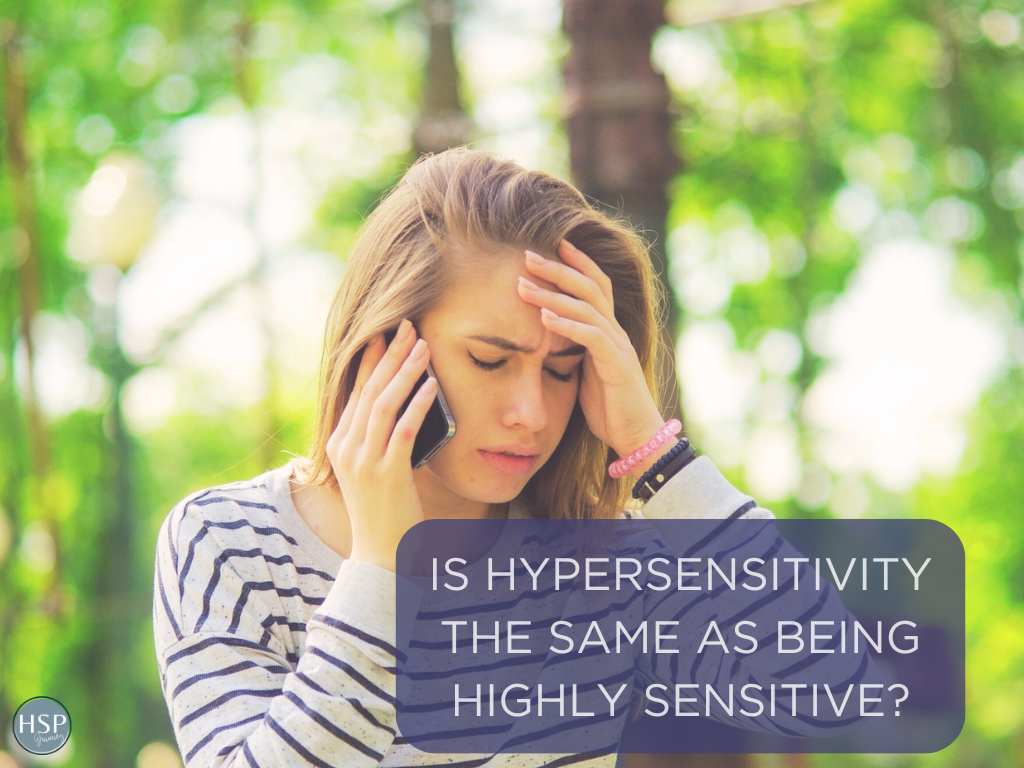You might be wondering if hypersensitivity is the same as being a highly sensitive person. You’re not alone, as I have wondered this myself. Through working with writers, editors, and creative people, I’ve noticed over the years that some people are quick to judge you, to jump down your throat, or quick to point out your flaws and insecurities. While I’ve always known I’m a sensitive person (even before I read about the HSP trait), it still bothered me that some people responded in emotionally volatile that left me feeling a sense of unpredictability and fear when having to deal with them.

Table of Contents
You may also be curious about the term hypersensitivity in relationship to the term highly sensitive person (HSP) or sensitivity processing sensitivity, a trait researched and detailed by Dr. Elain Aron in her book, The Highly Sensitive Person. For those of us who are HSPs, there most likely have been times in our lives where we’ve been called, “hypersensitive,” in a way meant to wound us. I ask the question, is hypersensitivity the same as being a highly sensitive person?
While some in the HSP community have adopted the word hypersensitive to turn it from a negative to a positive connotation, I suggest that we steer clear of this term and embrace a more balanced view of sensitivity. While being an HSP doesn’t automatically mean you’ll be overly, or hypersensitive to everything around you, those with unresolved childhood traumas, undiagnosed fears, OCDs, or panic disorders can contribute to someone’s hypersensitivity that contribute to a poor quality of life.
What Social Responses are Considered Hypersensitive
Flying into a rage at the simplest mistakes, being hot headed or antagonistic when someone asks something of you simply and directly are all signs that there could be underlying anger issues, emotional disturbances, or disorders at play. Responding to people and/or situations in unhealthy ways that show disorder are not the same at all as the HSP trait.
While an HSP might feel uncomfortable or mildly irritated about music being played too loudly in a restaurant, flying into a rage or yelling at the food server would be examples of how a hypersensitive person might be experiencing underlying triggers from a painful event in the past.
While some HSPs do also have spats of hypersensitivity, displaying behaviors that show a lack of self-control are not helpful and not congruent with the positive aspects of being a highly sensitive person.
It has been shown that many HSPs do experience childhood traumas more acutely, and do respond more negatively to stress in their lives. This said, getting adequate therapy or coaching to uncover and overcome past traumas is essential to fully thrive. If someone is constantly exasperated at their family, their co-workers, the friends, or random strangers whom they come into contact with, all are red flags that something more serious is going on under the surface.
Reactions to Emotional Stimuli:
You might find yourself more affected by emotional content in conversations, films, or music. Emotional sensitivity means you may cry more easily or feel more empathy towards others.
Interacting with Managers and Peers:
In a work environment, sensory and emotional sensitivity might lead you to overreact to constructive criticism or environmental cues. Open communication about your needs can help mitigate potential misunderstandings.
In social settings, reactions to small details or changes can make you feel out of place or misunderstood. Recognizing these reactions can help you manage your interactions better.

Looking for an HSP-Trained coach to help you align your life with your priorities?
Through my Highly Sensitive Person (HSP) certification with the Nickerson Institute, as well as being an HSP, I offer HSP coaching to develop specific goals around your HSP needs. We HSPs frequently deal with anxiety and overstimulated nervous systems that prevent us from achieving peace and attaining our life goals. HSP coaching with me includes a detailed review of your sensitivities and a mutually-desired plan for growth and management of this superpower to shift negativity and begin seeing yourself as the hero of your own story.
What People Often Think Of Hypersensitive Folks
People can have mixed opinions about hypersensitive, as well as highly sensitive, individuals. Some view them as overly sensitive or emotional. This perception can sometimes lead to misunderstandings or even stereotypes.
Strengths and Creativity
Despite these views, hypersensitive people often hide behind their anger, frustration, or emotional outbursts as a means of self-protection. They do tend to be wildly creative people because their heightened perception allows them to see beauty in everyday things that others might overlook. They are typically conscientious and find meaning in the small details of life. When sensitivity has morphed into hypersensitivity, though, look out. If you are feeling wildly reckless and as if no one cares, this isn’t healthy. You should seek mental help.
Empathy and Relationships
As opposed to hypersensitive folks, emotionally regulated highly sensitive people are usually empathetic, making them great in personal relationships. They can understand and feel others’ emotions deeply, which helps in building strong connections. Because of this empathy, they are often seen as understanding friends and partners.
Introverts and Inner Lives
Many hypersensitive people as well as highly sensitive people people tend to be introverts. They cherish their inner lives and need time alone to recharge. This introversion is not a weakness; it allows them to be self-aware and introspective.
Why is Sensitivity Often Vilified?
Sensitivity is sometimes perceived as a weakness in a world that values toughness and resilience. Many associate sensitivity with traits like neuroticism or even certain mental health disorders. This association can lead to negative perceptions.
One reason is the stigma around anything deemed “different.” People who are highly sensitive might react more intensely to stress or violence, which can be misunderstood by others.
Genetic roots and epigenetic effects often play a role in sensitivity. If someone inherits this trait, they might feel misunderstood or isolated. It’s not just about biology; experiences of trauma can enhance sensitivity, making those individuals seem overly reactive.
Some also confuse sensitive people with those displaying vulnerable narcissism. This can further alienate them. Sensitive individuals might avoid violent movies or chaotic environments, often viewed as signs of being overly fragile.
In cultures that champion stoicism and fearlessness, sensitivity can be seen as undesirable. Some think it’s a sign of weakness or instability, equating sensitivity with a lack of control or resilience.
Despite these misconceptions, the highly sensitive person trait is a legitimate personality trait with deep biological and genetic influences. Understanding this can help you appreciate the unique perspectives and strengths sensitive people bring to the world.
Looking for HSP Tools to Thrive in a Chaotic World?
The modern world is often overwhelming and stressful for those of us with sensitive nervous systems. Many of us have suffered from the challenges of high stress, anxiety, sensory overload, and mental health and physical health issues. Fortunately, after years of working with and researching Highly Sensitive People (HSPs), Julie Bjelland has developed many tools that have not only helped her but thousands of HSPs all over the world move out of survival mode living and into thriving. In this free webinar, she’ll share the tools that HSPs have found the most life-changing. Her goal is to help you live to your fullest potential because the world needs you.
Join this free webinar and get tools to help you thrive as an HSP!
Hypersensitivity and The Highly Sensitive Person: Are They The Same Thing?
Hypersensitivity and highly sensitive persons (HSPs) share characteristics such as heightened responsiveness to stimuli, emotional depth, and sensitivity to environmental factors. However, as mentioned above, hypersensitivity can be an exacerbated state someone is in due to an unhealthy mental state due to emotional trauma and triggers. A well-adjusted HSP should not be overly sensitive in a way that displays outbursts of anger, hatred, or evil intent.
Hypersensitivity and HSP Similarities
Both hypersensitivity and highly sensitive persons exhibit an intensified response to stimuli. You may notice you react strongly to loud noises or bright lights. Emotional responses can be more profound, causing deeper sadness or joy. Your sensory experiences, like the texture of clothes or the flavors of food, can also be amplified, making everyday experiences more intense.
Another similarity lies in the processing of sensory information. Both hypersensitivity and highly sensitive persons often use a deep cognitive approach. You may find yourself thinking deeply about things that others overlook, leading to a rich inner world. This trait is especially noted in sensory processing sensitivity, where one’s brain processes stimuli more thoroughly. This deep processing allows for greater creativity and empathy but can also lead to feeling overwhelmed. When an HSP cannot adequately regulate their nervous system, hypersensitive can be the result. Over0reaction, over-sensitivity, and over-catastrophization can be the result.
Hypersensitive and HSP Differences
Despite similarities, there’s a distinction between hypersensitivity and being a highly sensitive person. Not all hypersensitive individuals are HSPs. Hypersensitivity can be situational or related to specific triggers, such as allergies or particular sounds. In contrast, being a highly sensitive person encompasses a broader and more pervasive personality trait.
Highly sensitive persons often have a consistent way of interacting with the world. You might find that your sensitivity affects every area of your life, from your social interactions to how you process stress and emotions. Sensory-processing sensitivity, a characteristic of HSPs, means your nervous system is more finely tuned, making you more aware of subtleties in your environment.
Understanding these differences helps in tailoring strategies for managing your sensitivity, whether through lifestyle adjustments or professional support.
How to De-Escalate a Tense Situation With a Hypersensitive Person
In tense situations, hypersensitive individuals may benefit from environments that reduce stress and offer nurturing support. Skills to reduce sensory overload and anxiety can help create calmer interactions and foster better attention and self-care.
Skills Hypersensitive People Can Use To Become More Calm
Create a Nurturing Environment: Ensure a space that minimizes noise and visual distractions. A quiet room with soft lighting can help reduce sensory overload. Introduce comforting items like pillows, blankets, or familiar objects.
Practice Self-Care Techniques:Encourage short breaks and downtime to recharge. Activities like reading, meditation, or listening to calming music can help alleviate stress and anxiety. Simple self-care routines can effectively counteract burnout and withdrawal.
Seek Therapy and Support:Engaging in talk therapy or psychotherapy can provide valuable coping strategies. Therapy sessions can address anxiousness and depression, while offering tools to manage stress and multitasking challenges.
Frequently Asked Questions
Explore effective strategies for managing hypersensitivity, whether high sensitivity can be considered a disorder, ways to cope with a highly sensitive partner or friend, and various resources available for support.
What strategies are effective for managing hypersensitivity?
Engage in mindfulness practices like meditation to stay grounded. Setting boundaries helps protect your emotional well-being. Consider professional guidance through therapy, focusing on techniques tailored to highly sensitive people (HSPs) by experts like Elaine Aron.
Can being highly sensitive be considered a disorder?
High sensitivity itself is not classified as a disorder. It is a personality trait identified by Elaine Aron and can be measured using the Highly Sensitive Person Scale (HSPS). If it impacts your daily life significantly, consulting a mental health professional is advisable.
How can one cope with a highly sensitive partner or friend?
Understand and respect their need for downtime. Communicate openly about what triggers their stress. Offer support by being compassionate and patient, helping them manage overwhelming situations.
What resources are available for highly sensitive people seeking support?
Various self-help books, such as those by Elaine Aron, provide valuable insights. Online communities and forums offer a place to share experiences and advice. The Highly Sensitive Person test or self-test can help you better understand this trait and seek appropriate resources.
Be sensitive, be free
*This post contains affiliate links and I will be compensated if you make a purchase after clicking on my links*




